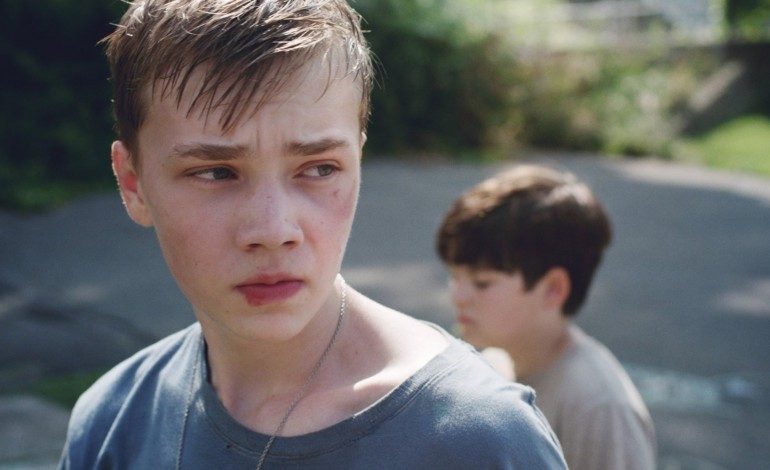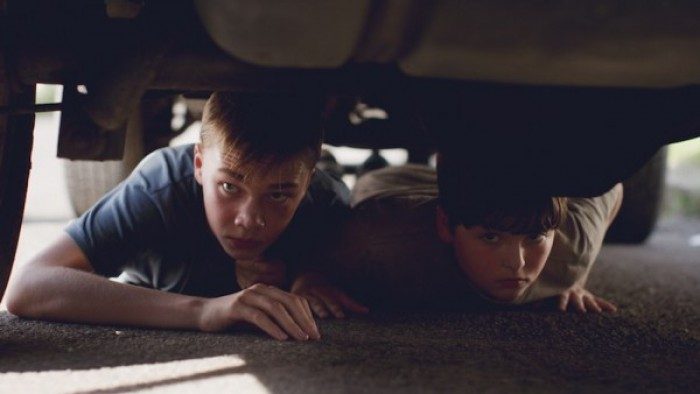

Felix Thompson goes back to basics for his small coming-of-age tale King Jack, a film that won him an Audience Award at the Tribeca Film Festival and a “Someone to Watch” accolade at the Independent Spirit Awards. Thompson is no stranger to film festivals – he’s brought four shorts to various fests in the past – however, King Jack is his first feature, and it is a flawless one at that. The writer-director takes a familiar day-in-the-life approach to coming-of-age storytelling and makes it entirely fresh through his strong and harshly realistic plot, characters, and visual dynamics. It’s as if we are witnessing youth directly from the perspective of its beaten-down yet elastic teenage subject, without a moment of inauthenticity.
Thompson’s film tells the story of 15-year-old Jack during a hazy summer weekend in his small town. Facing summer school, a ruthless local bully, rampant hormones, and family drama, Jack must take on even more pressure when his aunt suddenly falls ill and he is forced to take his 12-year-old cousin under his wing for the weekend. Events quickly (and violently) spiral out of control for Jack, leading him to learn hard lessons about friendship, happiness, and surviving the tumultuous years of high school. The short 80-minute runtime of the film captures a singular snapshot of a boy’s life, however, it proves to be time enough to illustrate the formative moments that make up childhood.
It would be a fair comparison to call King Jack an extended vignette of Boyhood (the Oscar winning 2014 film that captured 12 years in the life of one boy). Thompson takes the idea that our “formative years” manifest in simple moments that build upon each other, that a single weekend or moment in someone’s life could be a major turning point or imprint on their development. The moments that Thompson highlights are not especially remarkable or surprising – Jack sits in school, gets roughed up by the older boys, drinks a beer, does “fuck all” (as he describes it) with his cousin Ben, has his first kiss, then his first (almost) sexual encounter, and otherwise goes through the mundane motions of everyday life for a schoolboy (minus social media). The ordinary chain of events is what makes Thompson’s story extraordinary, allowing the audience to pull universal truths out of every situation Jack encounters.
In portraying his protagonist, Thompson has found a star in Charlie Plummer. Still a green thumb in the industry, the young actor has had roles on HBO’s Boardwalk Empire and the Netflix series Granite Flats. This starring vehicle is a perfect fit for Plummer who, being around the same age as his character during filming, lives and breathes Jack. All the false confidence of being 15, – from the highs of tearing down his young cousin, drinking with his friends, and sending the “hot” girl a “dick pic”, to the lows of his true inexperience, ridicule from his peers, and getting jumped by the neighborhood boys – sprouts organically from the page onto Plummer’s persona. He is able to express with a look the line he is toeing between innocence and experience, boyhood and manhood.
The picture that Thompson paints of this transition is a harsh one. He chooses to illustrate growing up as a young man in a small town to be a cycle of violence, and does so through the various ages of his male characters. The cycle begins with Jack’s older brother Tom (Christian Madsen, Divergent), who clearly has been an intimidating force within Jack’s life and even gave him the cruel nickname “Scab” which the entire school has since adopted. Next, there is Shane (Danny Flaherty, TV’s The Americans), Jack’s terrorizing bully, and the former victim of Tom (there is an implication that Shane has a restraining order against Tom). Thompson’s youngest, Ben (Cory Nichols), Jack’s cousin, represents optimism for youth, and an innocence still (mostly) uncorrupted; however, no punches are pulled once he enters Jack’s world. Each of these characters shows a different stage in the cycle, but Thompson makes it a point to force hope upon his story, as each of these boys are rulers of their own domain. He uses these moments to show the impact of choices, free will, and an underlying goodness within human nature.
In a story tackling life’s ordinary and transitive moments, Thompson’s visuals expertly take center stage. A blue scale palette infuses most scenes, drowning out color and lending intense focus to Jack’s perspective of misunderstood youth; like Jack’s mother reminds him, “you could be a good kid if you wanted,” but statements of this kind go in one ear and out the other for kids like Jack and the hued tone reflects that sentiment. On top of muted blues, Thompson and cinematographer Brandon Roots only use natural light throughout the film, forcing his characters to adapt to their surroundings in more ways than one. Hand-held camera techniques focus even more on Jack, as the scenes live with him, moving to his rhythm, and closing the gap between subject and audience. This creates a limited view, however, that plays well to the tunnel vision and lack of larger perspective felt by a teenage boy.
Verdict: 5 out of 5
The genius of Thompson’s work comes in one of the film’s final moments, when after narrowly surviving a beating, Jack discovers that some of the older boys took him and Ben home that night in their car, prompting Jack to ask Ben, “was it cool?”. This line speaks to the unfailing hope of youth and the uninhibited nature of a summer weekend in the life of a 15 year old boy. No matter how much Jack faced reality and change within the film’s 80 minutes, his experience doesn’t exceed these two days. He will likely continue to learn similar lessons throughout his teenage life, and his childhood will likely survive for many weekends to come. Thompson perfectly captures the inconsequential attitudes of youth – when hard truths roll off a kid’s back and when 80 minutes can feel both like a lifetime and a blink.



